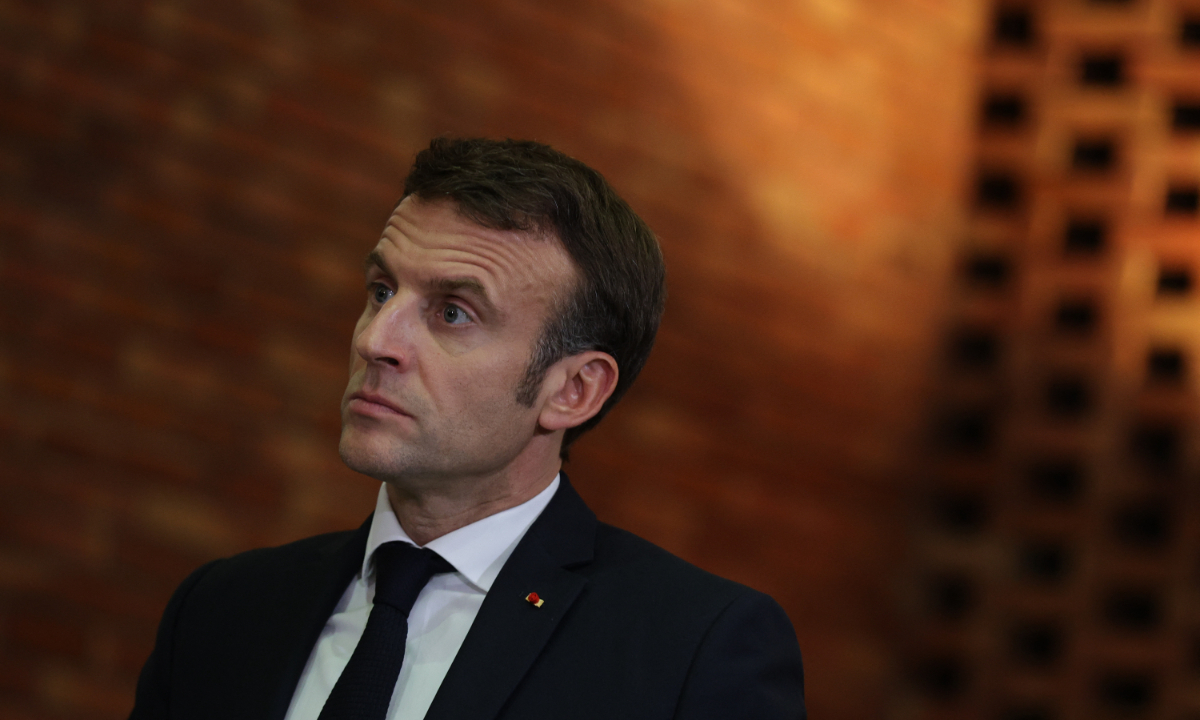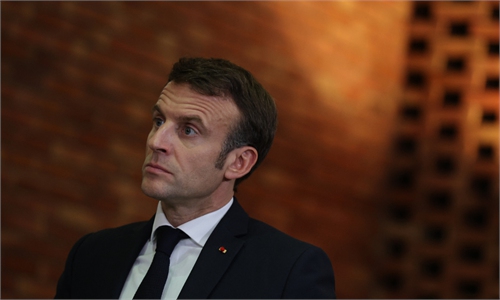‘Crisis of trust cannot be healed’ over US hegemonic policies despite planned visits of European leaders

French President Emmanuel Macron Photo:AFP
Contradictions between the US and the European Union, such as industrial competition and differences in strategic goals, will make it hard for the EU to bridge the rift with the US, and they may only maintain a superficial unity, Chinese analysts said on Sunday as European leaders are set to visit the US next week.
According to Reuters, French President Emmanuel Macron will travel to the US and meet with President Joe Biden on December 1. Macron's visit this time is aimed at highlighting France-US friendship rather than the bitter economic competition between the two sides. "But the elephant in the Oval Room will be the US Inflation Reduction Act," the report said.
The US Inflation Reduction Act (IRA), which came into effect in August, aims to reduce the cost of living for Americans. The bill covers not only huge investments in the energy sector and targeting climate change, but also generous subsidies for electric cars, batteries and renewable energy projects. However, many subsidies are available only for products made in the US.
Analysts said that EU companies, especially German carmakers, for which the US is a big export market, are among the biggest victims of the IRA package.
According to Fortune, the EU believes the measure is a potential trans-Atlantic trade barrier discriminating against foreign producers. "Those considerations have to weighed against the need to cooperate on the geopolitical stage and the essence of showing a united front," it warned.
Macron will try to convince the US it is in their interest not to weaken European companies at a time when Western allies are facing intense economic competition from China, according to Reuters.
According to UrduPoint News, EU foreign policy chief Josep Borrell said on Tuesday that he will also visit Washington next week to conduct high level talks with US officials.
Both the US and the EU have their own ideas about the upcoming visit, Cui Hongjian, director of the Department of European Studies at the China Institute of International Studies, told the Global Times. EU leaders want to show the EU's influence on global affairs while the US will try to woo and exert influence on EU when some countries are encountering problems in economy and diplomacy.
Energy issues and the CHIPS for America Act will also feature prominently in the talks at the White House. The US does not allow other global companies to invest in chip design and transfer in China, which also hurts European companies because their market is mainly from China, experts pointed out.
In the short term, neither side will compromise much on the bill, Wang Yiwei, director of the Institute of International Affairs at the Renmin University of China, told the Global Times on Sunday. "In a symbolic gesture to Europe, the US may launch some new bills to exempt certain firms from the bill or try to impose more costs on Chinese firms." But it will not heal the crisis of trust it has created between Europe and the US, Wang said.
In the name of competing with China, the US has become more overt in pursuing an America-first strategy. In effect, it sacrifices its allies to serve its own interest like what it did in the Russia-Ukraine conflict, Wang said.
By inciting the Russia-Ukraine conflict, the US has made great fortune by supplying energy to the EU, realizing its goal of containing Russia while leaving Europe to swallow the bitter pill as the continent continues to suffer from high inflation and pays a huge price for its energy security, analysts said.
Handelsblatt, a leading German business newspaper, published a commentary entitled "America remains economically selfish - Europe must accept that" on Friday, pointing out that the US, under pressure to compete with China, is introducing a series of protectionist measures against European interests, including subsidies for electric cars. To isolate China, the US is willing to "clash with its most important ally," the article said.
The US serves itself through its financial and technological hegemony at the expense of others, Wang said. "So, the US and Europe appear to be united on the surface, but in fact, they are still competitors."
According to Reuters, European Council President Charles Michel will visit China on December 1 to discuss a range of global challenges including the Ukraine conflict, tensions over the Taiwan question and EU concerns about imbalanced economic ties.
"Against the backdrop of a tense geopolitical and economic environment, the visit is a timely opportunity for both EU and China to engage," the European Council said in a statement.
Before coming to China, experts believe that it is no surprise for the European Council to stress that Europe prefers balance and peaceful coexistence among major powers. "It is a common feature of European diplomacy to create issues of common concern to bring the two sides closer," Cui said. "And if Europe wants to maintain its independence, it needs to be more careful in its dealings with the US and avoid completely following the US on every issue. It seems that the latter voice is starting to get a lot of attention in Europe."

